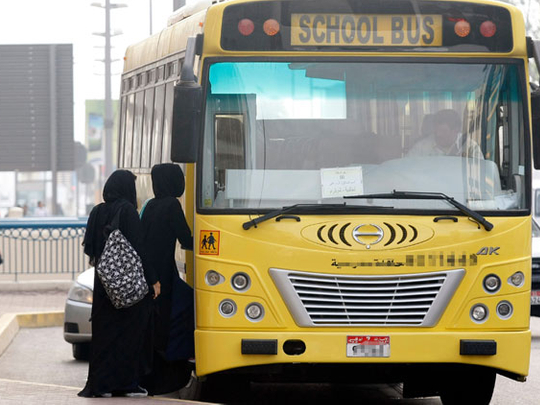
Abu Dhabi: Parents in the emirate whose children are still travelling on school buses that do not meet the new regulations have urged school authorities to implement the changes quickly.
The new regulations for buses, which were first announced in May by the Department of Transport, Abu Dhabi Police and the Abu Dhabi Education Council (Adec), aim to boost safety and convenience for children. The DoT announced in a statement sent on Wednesday that more than 1,000 buses, representing about 50 per cent of all Abu Dhabi school transport buses, already comply with the standards.
“My four-year-old daughter is in kindergarten and when I heard about these rules in May, I was hoping that they would be implemented on her bus by the start of the semester. Unfortunately, this has not happened yet and one day there was no conductor on the morning bus,” said a 46-year-old father from India.
His daughter is enrolled at a private school in an Abu Dhabi suburb.
“It takes just a moment for things to go wrong, so I request all school authorities to undertake these changes as early as possible,” he added.
When the regulations were first released, schools were told that they had to modify all school buses to meet the requirements within a year.
According to the regulations all school buses must be a uniform yellow to distinguish them from other buses. They must also feature warning signs and be labelled ‘School Bus’ on the outside in both Arabic and English.
Inside the vehicle, school authorities must ensure that there are no sharp ends, and that seats are fitted with soft, fire-resistant, shock-absorbing materials. Aisles must also be clear, and there should be no foldable seats, among other regulations.
In addition, buses must be equipped with GPS tracking systems, CCTV cameras, fire extinguishers, first-aid kits, voice alarm systems and provisions for special needs pupils. In addition, emergency exits should be clearly marked and accessible.
The regulations also require bus drivers to have valid school bus driver permits, and for a supervisor to accompany pupils below the age of 11. These buses are also not permitted to exceed a speed of 80km/h.
A number of private schools recently contacted by Gulf News said they had already complied with the new rule.
“All of the 30 buses in our fleet are already yellow in colour, and feature CCTV cameras and GPS tracking systems. We also follow other regulations specified by the Adec and DoT,” said Peter Lugg, principal at The Cambridge High School Abu Dhabi.
“More than ten buses in our fleet of 20 comply with these regulations, and we hope to finish refurbishing the rest before the end of the academic year,” said N.C. Vijayachandra, principal of Abu Dhabi Indian School.
Other schools are also working to implement the standards.
The Emirates Future International School in Abu Dhabi (EFIA), which uses a fleet of about 43 buses provided by a transportation company, said it was working with the company to roll out tracking systems and cameras by the end of the year.
“We want to introduce these systems in one go for all the buses. The GPS systems should be operational by the end of the month, followed by cameras soon after,” EFIA’s principal said.












